1930 Movie #5: "All Quiet On the Western Front"
All Quiet On the Western Front
Universal pictures, USA, 1930
Directed by Lewis Milestone
From the novel by Erich Maria Remarque
Adaptation & Dialogue - Maxwell Anderson
Screenplay - George Abbott
Adaptation - Del Andrews


"This story is neither an accusation nor a confession, and least of all an adventure, for death is not an adventure to those who stand face to face with it. It will try simply to tell of a generation of men who, even though they may have escaped its shells, were destroyed by the war..."
That’s the disclaimer that appears on screen at the start of this remarkable and powerful film. In fact, the film is so good, I’ve been having difficulty reviewing it. (After three attempts at my first draft, I’m starting over from scratch.) It’s something of a cliché that it’s easier to write a review of a bad film than a good one (and scathing reviews tend to be more memorable, as well…) I’ve also discovered that’s it’s easier to review melodrama than drama. Melodrama provides you with a clear plot, so you can fill half the review describing the structure of the story. Drama is not so generous. By some definitions, melodrama is about plot and drama is about character. Others would draw the high art/low art line, that melodrama is story and drama is allegory/metaphor. There is some truth in these ideas (though the lines are never so clear.)
All Quiet On the Western Front is not an allegory. It is a very direct piece of work, though not at all unsubtle. It’s got a lot on its mind, and wants you to follow what it’s telling you. The original semi-autobiographical novel by Erich Maria Remarque was based on his own experiences in the trenches of the Great War as a soldier in the German infantry. The book (and consequently the film) seems intended mostly as a document, as a statement of “this was what it was like.”
The story, episodic as it is, concerns a group of young men who enlist in the army, inspired by the stirring patriotic speech of their teacher, full of honor in battle and defense of country, couched in words of flattery, false modesty and implicit disparagement of any who would disagree. His oration is so effective that the boys rise up and enlist en masse. After a sequence at boot camp, where the jovial local postman has become a nasty, abusive drill sergeant, our band of barely differentiated protagonists is shipped to the front, where the war is in full swing.
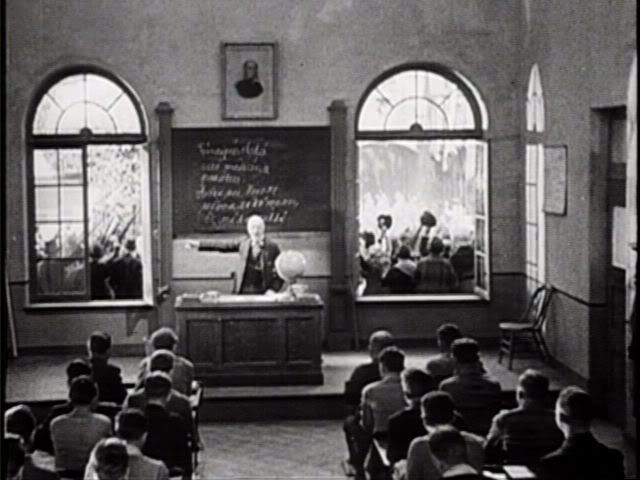

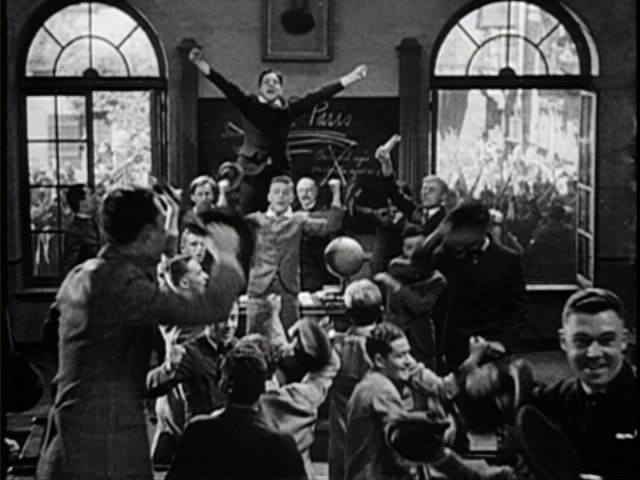
Here we meet two veteran soldiers: the sourly humorous Tjaden (Slim Summerville) and the gruff but fatherly Kat (charismatic and spectacularly broken-nosed Louis Wolheim). We get an idea of how well this war is going to go when Kat is introduced stealing a whole pig from a supply train. It turns out food is already scarce, and the soldiers have to resort to stealing it (from the Army, no less!) Kat takes lead boy Paul (Lew Ayres) under his wing, and the company sets off for the front, where they quickly suffer their first casualties.
The rest of the film plays out as a series of set pieces, more or less alternating between harrowing battle scenes and grimly humorous downtime. Paul becomes our central character largely by default, as his schoolmates die off or are mutilated and sent home. We don't really learn much about the other young men (though we know Kemmerick has an especially nice pair of boot. After he loses a leg, the boots get passed on to another soldier. And then another. And another...)


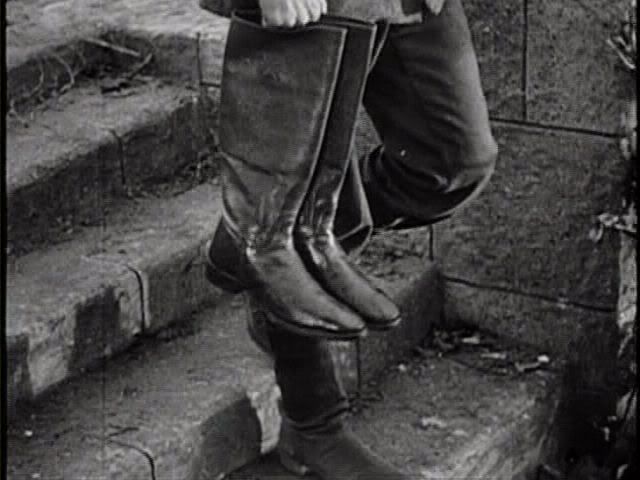
The main thrust of the film concerns the emotional and moral toll taken on the soldiers, in addition to the obvious cost in life and limb. In the field, the boys develop a sort of callous pragmatism towards moral questions; they have to kill, it's why they're here; it's okay to ask for Kemmerick's boots because he doesn't need them any more; if the mess sergeant has fixed dinner for a company of 150 and only 80 have survived, that's bad luck for the guys who died. In a very memorable sequence, Paul and 2 friends trade food for sex with a trio of starving French farm girls. The boys attention is all on the girls, while the girls' is mostly, but not entirely, on the food.
This scene would never have been allowed five years later. Of all the films I've seen that precede the enforcement of Hollywood's Production Code, this is the most daring. The Code was already in existence at this time, though mostly toothless, but it was still considered a guideline of what the general public would deem acceptable (and, more importantly, what the local censors would find acceptable.) Universal Pictures evidently felt strongly enough about the quality and importance of the film to allow director Milestone to ignore the Code. Aside from the relatively frank scene mentioned above, there are several sequences of brutal violence: a soldier with his eyes destroyed by an artillery blast; an enemy soldier who falls to his knees clutching at barbed wire disappears in a blast, leaving only his hands behind when the smoke clears; and the harrowing scene where Paul spends the night in a foxhole with a French soldier he has just stabbed.

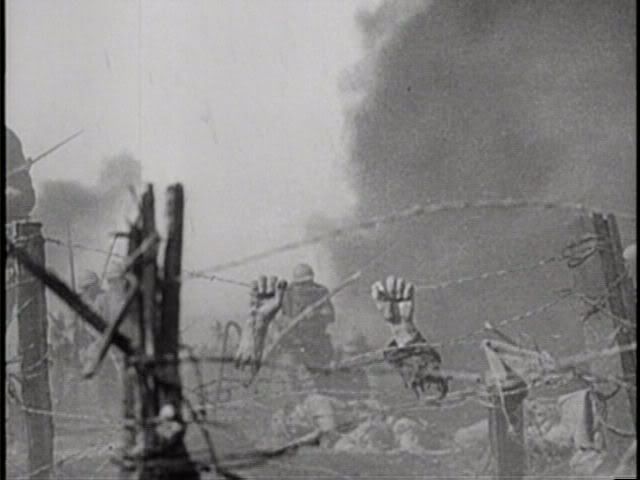

This last scene is one of Lew Ayres' moments to shine. This was his first starring role (he was only 20!) and he rises admirably to the material. In the foxhole scene, Paul stabs the Frenchman, who then takes a very long time to die. Paul's reactions to the dying man (and, eventually, corpse) range wildly and swiftly between remorse, sympathy and rage, all backed by a continuing terror of the carnage above that keeps him trapped in the hole.
Paul, as portrayed by Ayres, is a man of conscience. We are told in the opening scene that he is an aspiring author, and throughout he is consistently shown as being very aware of those around him. He's the most likely to offer sympathy to a wounded comrade, or offer a helping hand where needed. When Himmelschloss, the postman turned drill sergeant, turns up in the trenches, the boys find it hilarious, thought they are paradoxically kind of glad to see him. When Himmelschloss sees his first combat action, he freaks out, collapsing in terror. Paul actually stops his charge to help him pull together, get on his feet, and start moving again. (This almost immediately precedes the foxhole scene.)
The emotional climax of the film is Paul's brief homecoming. Allowed to travel home on leave (after at least three years of war!), Paul reunites with his family (whom the audience haven't actually met up to this point.) He visits with his mother, now bed-ridden, and his little sister. Then his proud papa takes him out to the local pub, where the old men clap Paul on the back and tell him how lucky he is to be getting that good army food (“Only the best for our boys!”). The conversation devolves into an argument about where the army should best “break through” the enemy lines. One of the old men even tells Paul that he (Paul) just doesn't get the war. “You know the details, of course, but this is the whole...” Paul slips away while they're arguing.
Paul wanders by his old school, and hears his teacher haranguing a new crop of boys with the same old “glory of war” speech. Invited in to speak to the boys, Paul tries to beg off. Pushed into it he tries to tell the truth: “We live in the trenches out there. We fight. We try not to be killed. Sometimes we are. That's all.” This does not go over well with either teacher or students. When the teacher objects, Paul briefly lashes out at him, verbally of course: “You still think it's beautiful and sweet to die for your country, don't you? We used to think you knew. The first bombardment taught us better. It's dirty and painful to die for your country.” Disturbed and angered by the ignorance around him, Paul chooses to return to the front four days early.
All Quiet On the Western Front won two Academy Awards in 1931, Best Picture and Best Director (Lewis Milestone.) Milestone had won “Best Director, Comedy Picture” for the 1927 Two Arabian Knights (starring Louis Wolheim), and Best Director again for 1931's excellent The Front Page (well worth seeking out). His long career includes the 1940 Best Picture winner (Of Mice and Men) and 1960's Ocean's Eleven. In All Quiet..., Milestone's approach is a sort of artful realism. While hardly a cinema vérité piece, the film remains convincing throughout. The military detail was heavily researched and many war veterans were hired as experts and extras. Veterans from all sides of the conflict acted in the film in German uniform, in what must have been a very odd reunion. The picture is expertly paced. At just over two hours long, it never lags. The tone of the film changes from scene to scene, never allowing the desperation of some parts to become overwhelming. The overall effect is tragic, but never quite depressing.

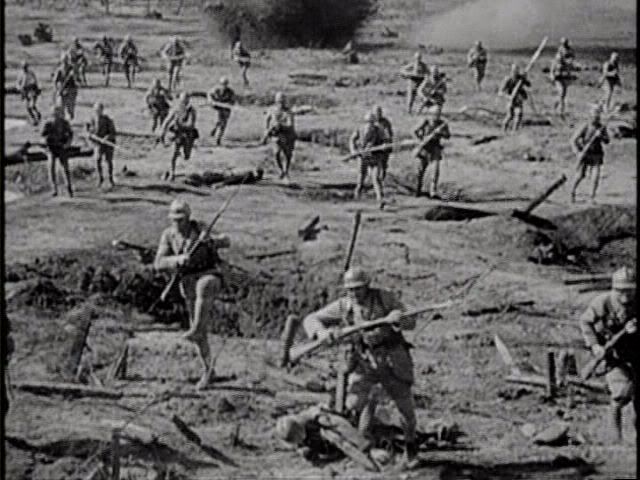
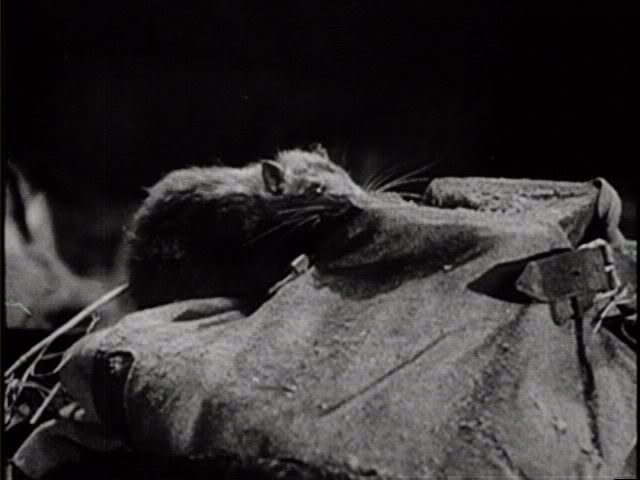
All Quiet... is a huge, expensive blockbuster, a prestige production for Universal Studios. As the cliché goes, every penny is up on screen. The film looks great. The battle scenes are awesome displays of destruction and terror. The sets are large and densely layered with detail. (Paul's hometown would continue to appear in Universal's horror pictures throughout the 30's). It has the honor of being one of the most frequently banned films of the early twentieth century. The Nazis hated it, of course. It clashed with the version of history they were trying to sell. Even before they were in power, they'd sabotage screenings with stink bombs or live rats(!). The film had also been banned in Italy and France (once they began to suspect a war was coming), among others. Not a good film to be showing if you want to stir up a strong fighting spirit in the populace at large.
Oddly, there is a sequel: 1937's The Road Back, directed by James Whale (of Frankenstein fame). Slim Summerville even reprises his role as Tjaden. A tale of soldiers readjusting to post-war civilian life, and based on another novel by Remarque, the film was compromised by studio tampering after Whale had finished it. Universal (now under new management) added some comedic scenes and toned down or removed the anti-Nazi slant retained from the novel. (Wouldn't want to alienate our foreign box office, now would we?)



Well, I hope I did the film some justice. It's been three months since I originally watched the film (sorry I'm so slow!), and I've watched it piecemeal over the last weeks preparing for this review. In the end, I chose to lay off the major themes of the thing. The film speaks quite eloquently for itself, and this ain't no school essay. To go on about the important themes would seem like belaboring the obvious, something the film itself never does. It's odd to think of a film so grim as an “entertainment,” but that's what it is. The serious subject matter, rather than being diminished by this approach, is instead made more easily digestible. The story and characters are treated with respect, sympathy and a knowing humor based in human folly. I had worried that watching a serious anti-war film would be a chore, or a depressing experience.
It seems strange to say it, but in many ways it was a pleasure.